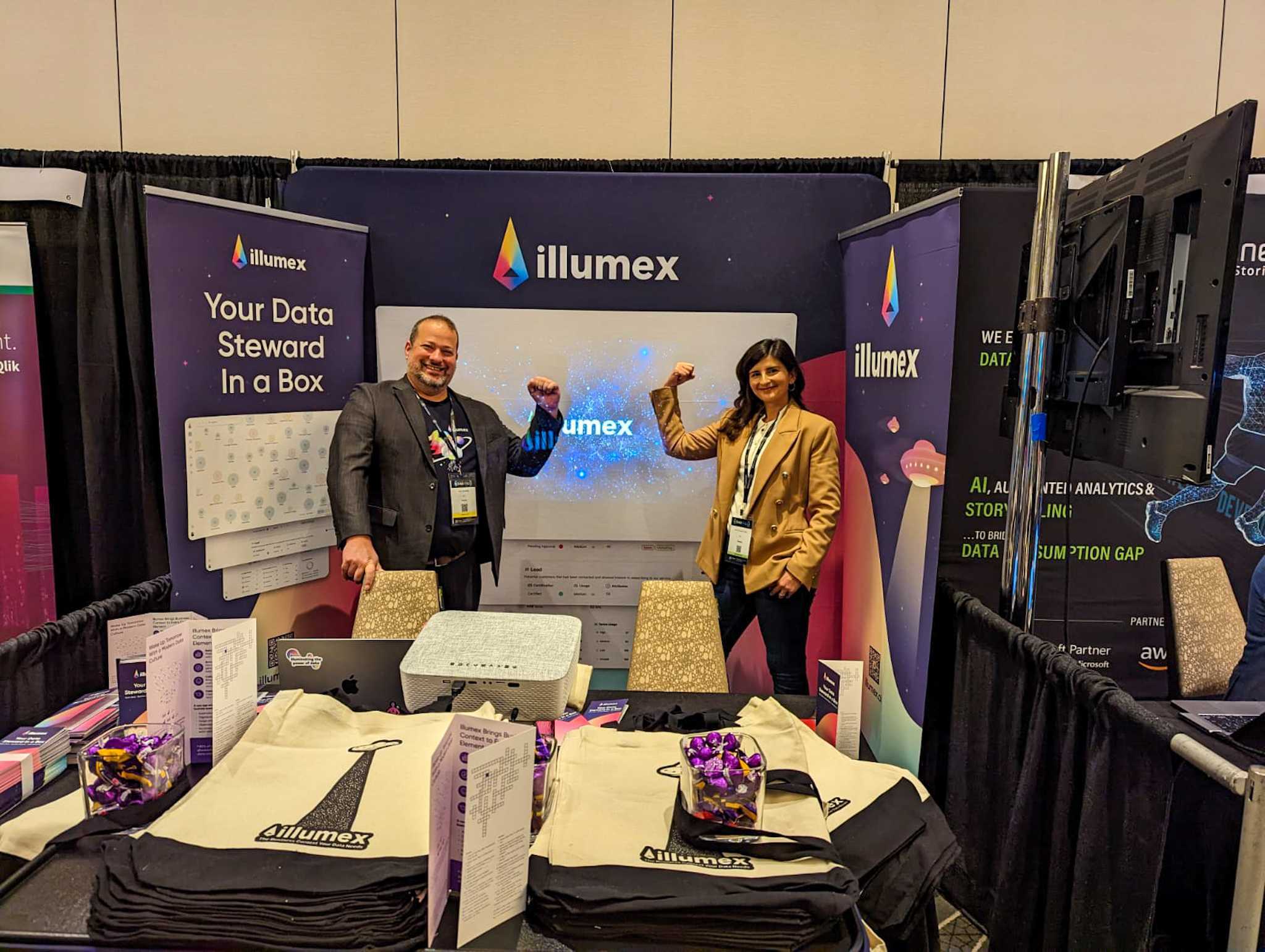
Top Insights from the Boston and London CDAO Conferences
The Main Topics that the Leading CDOs of the World Discussed in Boston and London this Fall
The fall event season was peaking, and it was great to be back to the face-to-face conferences! Nowadays, we even have an acronym for that – IRL event.
For us at at illumex, Corinium’s Chief Data and Analytics Officers event series was incredibly relevant and productive.
CDAO London and CDAO Boston brought together over 600 attendees from the varied industries like financial, insurance, and healthcare, almost 150 Data Leaders from companies like Mars, Expedia, and JP Morgan as speakers, and nearly 70 D&A companies as sponsors, which we had the pleasure to share the conference floor with.
While there were some differences between the mostly European companies that we met in London, and the mostly US companies that we met in Boston, the similarities were clear and straightforward: Governance, Data Platforms, Analytics Effectiveness, the Role of the CDO and People.
These are some of our top summarized learnings on those important themes from the CDAO events and participants in London and Boston:
Governance-Governance-Governance:
- Governance strategies can both protect and enable growth.
- In order to align business and data strategies, organizations should prioritize implementing a Data Governance strategy.
- Inconsistent definitions and business rules can hinder decision-making, Data Governance can help standardize and clarify these.
- In industries with strict regulations, like financial services, certifying data ahead of time can save time and effort in the Data Governance process.
- To derive insights from data, organizations need to have a clear common understanding of the data they have.
- Data literacy and business literacy go hand in hand, and both sides should be educated about the other’s perspective, otherwise they will never be able to support each other.
- It is important to understand the context in which data is being used, as different use cases may require different interpretations of the same data.
- The quality of data should be prioritized as the primary investment in order to gain trust and increase data monetization.
- Cataloging data services and their associated terms and metrics can improve their accessibility.
- Establishing a business support desk specifically for data can improve operations and processes.
Data Platforms
- Data should be placed at the center of all people processes and applications.
- This will help to address the challenges of data unification that often arise during organizational change processes, like M&A.
- Data is the backbone of the business, and should be treated as one of the organization’s crucial driving forces. It can never be a side project.
- Data sharing and collaboration within industries is the next big shift. Organizations should promote building trust with their peers and competitors in order to enable this process and spearhead it. This cultural change may require transition to a decentralized data model that allows global access to local data, promoting democratization and self-service capabilities.
- An enterprise data platform can serve as a “motherboard” for all businesses, allowing for seamless data sharing across the organization.
- Always remember that the ultimate goal is to drive business impact, not just engineering excellence.
Analytics Efficiencies
- Prioritize by experimenting first on one modality (such as emails, out of all channels) and show the value in the data. This will help you focus your efforts on the most important data and avoid wasting time on irrelevant information.
- Consider using tools and techniques that can help you find and analyze data quickly, such as machine catalogs, natural language processing, and data visualization tools.
- Create collaboration communities around data products, and share best practices and strategies for finding and analyzing them efficiently. This can help you avoid duplicating efforts as well as learn from others’ experience.
- Show analytics as part of every business presentation to make it easier to track their associated revenue.
- Build data as you would build a product, addressing adoption challenges and fostering teamwork among multidisciplinary teams.
- When you develop the 5-year roadmap of business initiatives,, map different data resources (tools, FTE, training) associated with these initiatives. For example, for a customer segmentation project, you need a catalog, data steward, DS, logs infrastructure, and other resources.
The People Factor
- Instead of co-existing, collaboration is key for the success of bringing together the business and data worlds (or data producers and data consumers). Facilitating physical proximity between departments, when possible, is ideal. Otherwise, initiate communities and alignment meetings, such as a customer advisory board for data teams, for example.
- Upskilling the non-data workforce with data literacy can be achieved through training and gamification. This is crucial for a successful data culture in your organization.
- Focus on building a data-driven culture that aligns the purpose of data to meet the employee needs.
- Embrace self-service that will provide trustworthy data for employees to use independently.
- Address the challenges of talent acquisition and retention by showing how data initiatives can help attract and retain top talent.
- When it comes to data projects, Data teams should not be the only winners in the room. They should sometimes lead, sometimes support, and sometimes collaborate with others.
- A successful data organization goes beyond just centralized teams, it includes vendor data literacy services, data councils, and governance requirements.
- Building credibility and deep care about customer challenges create trust.
We felt that during the conferences, As you can see, the “People Factor” got the most attention. It is not surprising, given that we have to handle change resistance, recruit change ambassadors and build frameworks that allow self-service.
The Evolving Role of the CDO
Another vital topic discussed in both conferences was the role of the CDO. It was extensively discussed during the CDO keynotes. Some of the noticeable topics were:
- The main goal of the CDO is to establish a data-driven culture within the company. This will increase the velocity of creation and use of data products, and boost data literacy, answering as many business questions as possible in the shortest time possible.
- The data organization should not be a cost center, but should deliver measurable monetary value. Thus, the CFO is the CDO’s new best friend, optimizing workforce placement and capital deployment.
- This will require change management skills and consulting expertise and the ability to consult and integrate insights into business decision-making.
- Your focus should be on developing an operating data model that integrates data insights into business decision-making processes, and simplifies the D&A jargon and concepts to enable a data-driven culture.
- PR is important: clearly communicate the value of your data initiatives to decision-makers through storytelling. Data is a business imperative and should be published and reported on regularly with KPIs and progress updates. This will help secure budgets for data projects.
- If you come from a tech background, it is important to learn about the domain you are working in and become a part of the decision-making process.
- Till now, A/B testing was mainly used in the Marketing and Product teams. From now on, the KPIs for the data teams will include tracking the value of A/B testing for data and analytics projects.
- For the next year, the balance between defense and offense will be important, with the majority of time spent on defense to keep executives out of trouble.
- To drive real behavioral change, CDAOs (Chief Data Analytics Officers) should have empathy for their consumers, and focus on building credibility and trust.
- CDOs have a lot of flexibility and freedom in their role, entrepreneurial leadership will be the real game-changer in this role.
The transformation of the Chief Data Officer role into the Chief Data and Analytics Officer role signifies a shift towards a business-focused approach, with the main goal of better aligning data and analytics with the company’s strategic plan. Previously, CDO organizations often focused on data collection and cleansing without effectively demonstrating the value of this work to the business. By combining the roles, multidisciplinary teams can work together more closely to deliver greater value from data and analytics. CDAO “tool” to achieve business results include Governance, Data Platforms, ensuring Analytics efficiency and investing in Data Culture and Literacy.
Conclusion
Going to IRL events was a great pleasure. But other than the rush of a live event, it had another important benefit – the opportunity of meeting other professionals who are struggling with the same real life challenges, and learning from their experiences. Though connecting the organization’s data and business realms and leading Data Governance initiatives are both the current imperatives, they still encounter resistance: their value might not be clearly communicated, budgets are not easily allocated to these initiatives, and there still is a general mistrust in the business answers that data provides.
We found that the platform that the two CDAO conferences provided, also provided potential roadmaps to address the above mentioned challenges. We tried to outline some of these roadmaps in this blog.




